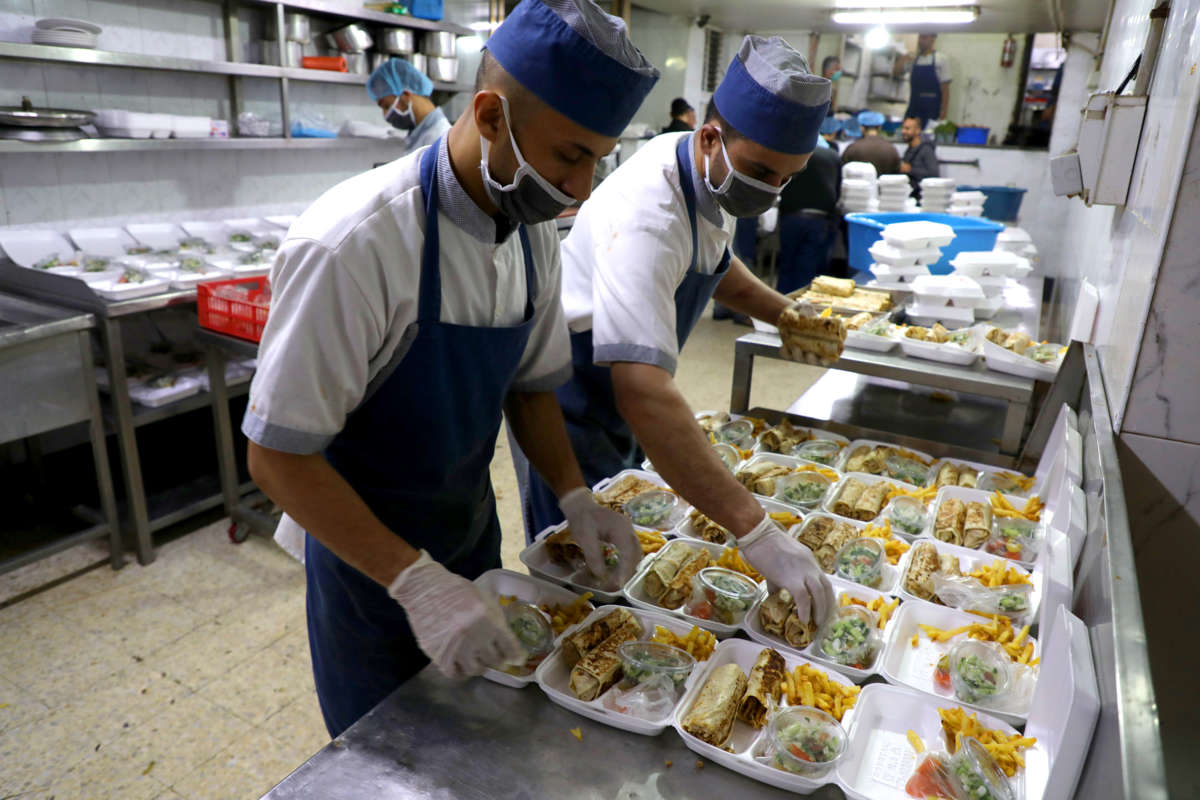Part of the Series
Despair and Disparity: The Uneven Burdens of COVID-19
Struggle and Solidarity: Writing Toward Palestinian Liberation
As a Palestinian woman from Jerusalem and a mental health professional, I am both treating and experiencing the extensive impact and far-reaching ramifications of the COVID-19 pandemic.
Across the world, communities are dealing with the unbearable pain of death and serious illness, compounded by not being able to comfort or even mourn the victims. On a global scale, people are facing what for many are unprecedented restrictions on freedoms, insecurity and anxiety about the future.
In these testing times, I feel compelled to share our special, decades-long Palestinian caregivers’ experience with dispossession, displacement, denial of basic rights, uncertainty and visceral grief while still maintaining a sense of joy, beauty and finding collective responses that give us realistic hope.
While COVID-19 is forcing millions around the world to make impossible, unfair choices between maintaining their own safety and providing essential needs for their loved ones, this has also been a time of extraordinary courage, resilience and solidarity. Severely overstretched health care workers caring for increasing numbers of COVID-19 patients use ingenuity to overcome shortages of medical supplies, risking their own lives.
What has helped me and my colleagues most in facing multiple crises was mutual solidarity and support.
I am reminded of my experience, 18 years ago this April, as part of a team of Palestinian psychologists from Jerusalem volunteering with the United Nations in the Jenin refugee camp in the occupied Palestinian territory in 2002.
We were there to help our colleagues dealing with trauma following Israel’s military assault on the tiny, densely populated camp. The Israeli military summarily executed Palestinian civilians, using others as human shields and flattening entire residential areas in what amounted to war crimes, according to Human Rights Watch.
Israel had completely sealed off the camp, along with other Palestinian areas under occupation, leaving residents with no access to medical aid and other essential services as helicopter gunship fire rained down, and massive tank-like armed bulldozers leveled houses.
Our colleagues there needed our help as they themselves were traumatized. Though the tanks had withdrawn to the outskirts of the camp, the biggest fear of one social worker, whose house had been demolished, was that they would invade again, and this time hurt a member of her family.
With the spread of COVID-19, collective solidarity is on display across the occupied Palestinian territory. In East Jerusalem — where Israel illegally exercises control and racially discriminates against Indigenous Palestinians, treating us as precarious “permanent” residents in our own city — we don’t have any formal institutions to care for us.
More than 80 Palestinian nongovernmental organizations came together to form a coalition helping with everything from food to medicine, psycho-social support and even quarantine shelters. The coalition succeeded in obtaining and properly equipping three Palestinian-owned hotels in Jerusalem as dormitories for doctors and nurses from West Bank towns who cannot cross Israeli military checkpoints to return home.
While it is true that COVID-19 knows no borders and can affect anyone regardless of standing or background, the naked truth is that this pandemic will hit some communities much harder than others. To paraphrase novelist George Orwell, we are all equal, but some of us are more equal than others.
Black Americans have a disproportionately high death rate in the United States due to decades of racist policies creating social and economic disparities. Migrants are particularly vulnerable, living in crowded conditions with no access to health care and far from their own communities.
We all fear for Palestinians in Gaza, who have been living under Israeli siege for more than 13 years and have been subjected to three major Israeli military assaults in the past 10 years that have killed thousands and devastated infrastructure.
Yet Gaza also inspires me. On my many trips there to train and work with partner organizations, I am always encouraged by how Palestinians in Gaza, despite impossible challenges, still somehow manage to open businesses, provide health care, run successful community organizations, laugh, joke, sing and produce distinguished information technology experts supporting local and international businesses. Inspired by a long history of overcoming injustices and grief, they are defiant and have a strong belief in our collective ability to prevail.
We feel the pain of the people in China, the United States, Italy, Spain, the United Kingdom, Iran and elsewhere, and we say to people across the world, “We stand with you in fighting this pandemic and in envisioning a more just and beautiful future.”
The COVID-19 crisis has thrown into sharp relief how years of capitalist austerity measures have starved health and other public systems. At the same time, military and “security” spending has only grown. The U.S. government, for example, spends billions of dollars in taxpayers’ money on military aid to Israel, enabling it to expand its occupation and apartheid policies, while leaving essential services in the U.S. to private corporations.
We must hold governments accountable and change the priorities to put health care, education, fair jobs, the environment and other essential needs before military spending and so-called “securitization” incapable of protecting us.
The lessons that we as Palestinians have learned is that in moments of crisis, we must gather our collective strength through solidarity actions and use the occasion to reimagine and rebuild our systems. In short, to be resilient, compassionate and defiant.
Media that fights fascism
Truthout is funded almost entirely by readers — that’s why we can speak truth to power and cut against the mainstream narrative. But independent journalists at Truthout face mounting political repression under Trump.
We rely on your support to survive McCarthyist censorship. Please make a tax-deductible one-time or monthly donation.
